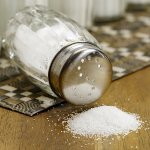National Iodine Day in Thailand Date in the current year: June 25, 2026
 National Iodine Day is observed in Thailand annually on June 25. It was established by the Thai government in 2002 in order to raise public awareness of the dangers of iodine deficiency and to highlight the achievements of the country’s iodine deficiency disorder elimination program.
National Iodine Day is observed in Thailand annually on June 25. It was established by the Thai government in 2002 in order to raise public awareness of the dangers of iodine deficiency and to highlight the achievements of the country’s iodine deficiency disorder elimination program.Iodine is an essential mineral nutrient, which plays a crucial role in the synthesis of thyroid hormones that affect multiple physiological processes in the body, including growth and development, metabolism, heart rate, and body temperature. Severe iodine deficiency results in various disorders, collectively known as iodine deficiency disorders (IDDs): hypothyroidism, goiter, cretinism, and others.
The recommended daily intake of iodine depends on one’s age, body weight, and physical condition. The daily reference intake developed by the National Academy of Medicine is 100 µg for infants up to 6 months, 130 µg for infants aged 7–12 months, 90 µg for children up to 8 years, 120 µg for children aged 9–13, 150 µg for adults, 220 µg for pregnant women, and 290 µg for lactating women.
The main natural sources of dietary iodine are seafood (fish, shellfish and edible seaweed), dairy products and eggs (provided that animals consumed enough iodine), and plants grown on iodine-rich soils. Due to this, iodine deficiency is most common in remote inland areas where people rarely eat marine foods and plants are grown in iodine-poor soil.
According to the World Health Organization, iodine deficiency affects approximately two billion people across the world. The most affected regions are the African Region, the Western Pacific Region, and the South-East Asian Region, which includes Thailand.
Thailand launched its National Iodine Deficiency Disorder Elimination Program in 1989. Two years later, the government of Thailand established the National Committee for IDD Control, presided over by Princess Maha Chakri Sirindhorn, the second daughter of King Bhumibol Adulyadej.
The key IDD prevention measures applied by the Ministry of Public Health of Thailand are supplying the population with iodized salt (according to regulations, all edible salt must contain 20–40 mg iodine per kg), providing iodine supplements to pregnant and lactating women, and providing children in remote areas where access to iodized salt is limited with iodized drinking water.
To cover as many households as possible and connect communities with the central healthcare administration, the Ministry of Public Health launched the Iodine Villages initiative. Thai “Iodine Villages” have IDD prevention and control policies implemented, making sure that households have access to iodized salt and pregnant women receive iodine supplements.
In August 2002, the government of Thailand established National Iodine Day to educate the population about iodine deficiency and recognize the National IDD Elimination Program. It is observed on June 25, because on this day in 1997, the International Council for the Control of Iodine Deficiency Disorders Global Network awarded King Bhumibol Adulyadej with a gold medal for his contribution to the prevention of iodine deficiency.
- Category
- Other Observances
- Country
- Thailand
- Tags
- National Iodine Day in Thailand, observances in Thailand, iodine deficiency, iodine deficiency disorders, iodine deficiency prevention